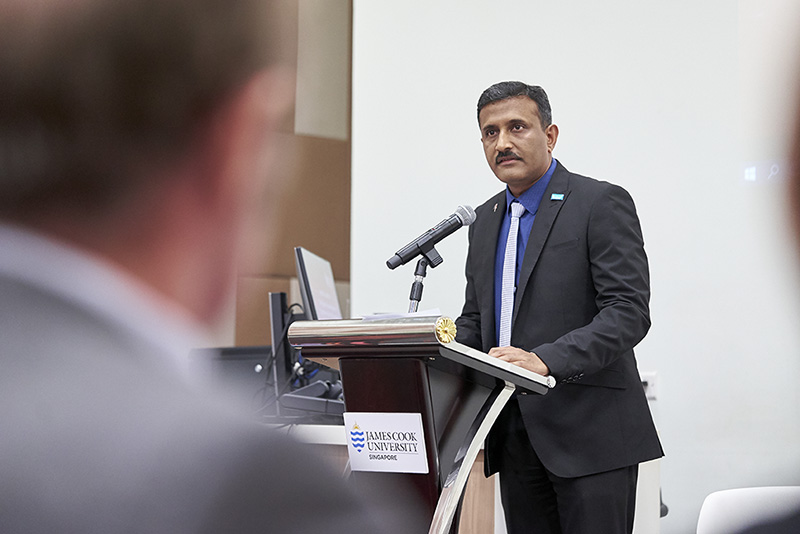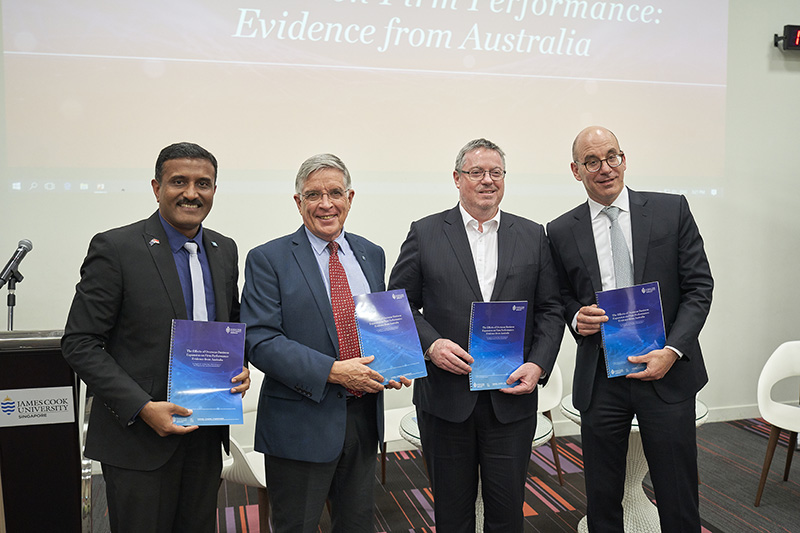Media Releases
Impacts of Australian firms’ overseas business activities
Media Releases
How do overseas business activities affect the performance of business firms?
Expanding a business overseas is an appealing idea for many firms. This is particularly true of Australia’s small open economy, where firms are actively engaged in overseas business operations such as exports and outsourcing.
In fact, Australian businesses have, in recent years, expanded their operations into Asia and beyond for a variety of reasons — which include broader market, cost of production, distribution opportunities, diversification of the business and to manage employment in terms of skills and costs.
That said, it is important to consider the impact such activities may have on the firm’s performance — notably the employment of both casual and full-time workers, profitability, and total sales revenue.
 (Associate Professor Abhishek Bhati at the report launch of “The Effects of Overseas Business Expansion on Firm Performance: Evidence from Australia”)
(Associate Professor Abhishek Bhati at the report launch of “The Effects of Overseas Business Expansion on Firm Performance: Evidence from Australia”)
Associate Professor Abhishek Bhati, Campus Dean and Head of Teaching, Learning and Student Engagement for James Cook University in Singapore, elaborates, “In situations where a firm expands operations overseas, it may well be due to its reduced or lost competitiveness in its home market. The reduced or lost competitiveness can lead to employment loss at home if the business significantly scales down or completely closes its operations.”
He adds, however, “The growth in Asian markets could have a positive impact on the organisation’s growth and available jobs in Australia. As such, the decision to expand overseas may be instrumental in regaining competitiveness and hence in protecting jobs in Australia.”
This economic discourse is examined in “The Effects of Overseas Business Expansion on Firm Performance: Evidence from Australia,” which saw its report launch on Friday 2 August 2019 at the Singapore campus of James Cook University.
 (From left to right: Associate Professor Abhishek Bhati, Campus Dean and Head of Teaching, Learning and Student Engagement, James Cook University in Singapore; Mr Bill Tweddell, Chancellor, James Cook University; His Excellency Bruce Gosper, Australian High Commissioner to Singapore; and Mr Jonathan Glickfeld, General Manager, Visy Trading Singapore; releasing the report)
(From left to right: Associate Professor Abhishek Bhati, Campus Dean and Head of Teaching, Learning and Student Engagement, James Cook University in Singapore; Mr Bill Tweddell, Chancellor, James Cook University; His Excellency Bruce Gosper, Australian High Commissioner to Singapore; and Mr Jonathan Glickfeld, General Manager, Visy Trading Singapore; releasing the report)
Dr Hong-Bo Liu, Adjunct Research Fellow in the College of Business, Law & Governance at James Cook University, along with colleagues from the same college — Dr Rabiul Beg, Associate Professor Sizhong Sun, Professor Zhang-Yue Zhou — as well as Associate Professor Bhati, co-authored the report to present a better understanding of the interaction between a firm’s overseas business activities and its performance in the domestic market.
In order to estimate a firm’s performance in relation to overseas business activities, a multi-year survey dataset from the Business Longitudinal Database in Australia, collected by the Australian Bureau of Statistics, was used.
The investigation uncovered the following:
- Outsourcing negatively affects employment of casual workers but not full-time workers.
- Outsourcing negatively affects a firm’s profitability and positively affects its total sales revenue.
- Import generates positive impacts on employment of both casual and full-time workers and total sales revenue, and weakly and negatively affects profitability.
- Export negatively affects employment of both casual and full-time workers, and positively affects sales revenue.
However, as the report states, “the negative impact, for example the perceived negative impact of outsourcing on employment, is likely not to be as severe as one would expect,” indicating that the opportunity for growth may indeed outweigh and therefore offset the negative impacts generated.
This offers great practical significance to businesses and policymakers. As such, this suggests that overseas business expansion can be a critical part of a growth strategy, and policymakers should not discourage a firm from engaging in overseas business activities. Associate Professor Bhati explains that “overseas business expansion can become a useful approach to boost Australia’s future economic wealth and needs to be promoted by governments and employee groups alike.”
 (From left to right: Dr Jacob Wood, Associate Professor Riccardo Welters, Mr Ben Smith, His Excellency Bruce Gosper, Ms Ally Tehan)
(From left to right: Dr Jacob Wood, Associate Professor Riccardo Welters, Mr Ben Smith, His Excellency Bruce Gosper, Ms Ally Tehan)
The report launch also included a panel discussion, moderated by Dr Jacob Wood, Senior Lecturer in Business in the Singapore campus of James Cook University, comprising of the following experts:
- His Excellency Bruce Gosper - Australian High Commissioner to Singapore
- Associate Professor Riccardo Welters - Head, Economics and Marketing, College of Business, Law and Governance, James Cook University (Australia)
- Mr Ben Smith - Head of Australia New Zealand Desk, ANZ
- Ms Ally Tehan - Co-Founder, Ally’s Basket
The experts shared valuable insights that helped to provide nuance as well as broaden the discussion of overseas business expansion.
Ultimately, overseas business expansion may offer significant benefits that cannot be discounted by the risks involved.
To read the full report, click here.
Find out more information about our Business courses here.
For further information on areas of research strength in Business Research, view our booklet here.
Contacts
Academic matters: [email protected]
Media: [email protected]